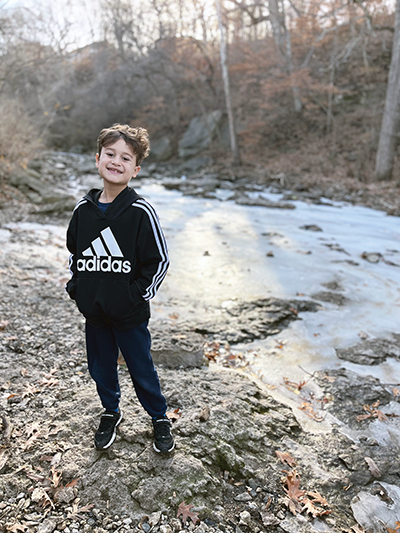Acute Lymphocytic Leukemia Survivor
Find strength in the support around you

When Owen Weeks was diagnosed with acute lymphocytic leukemia (ALL) at two years old, his mom Hannah quickly learned the value of support. She credits an expert medical team and her family for supporting them as they all worked together to help Owen reach remission.
Owen’s diagnosis didn’t come quickly. He was what most nurses and doctors called typical — a toddler with frequent colds, strep throat, ear infections and impetigo (skin infection). It happened so often, though, that I kept taking him in. Finally, an urgent care doctor noticed how pale Owen was and agreed that it might be something serious. He ran blood tests, and Owen’s hemoglobin was dangerously low. He was transported by ambulance to a local children’s hospital for more blood tests and a bone marrow biopsy. The physician on call happened to be an ALL specialist, and he felt the test results were going to indicate some type of cancer.
At first I panicked, but when they came back with an ALL diagnosis, I was a little relieved. Coincidentally, I was in nursing school and had just finished my pediatric oncology rotation on the same unit where Owen was admitted, and I had some knowledge about ALL. Most importantly, I knew it was treatable.
Right away, the physician presented his plan. We were blessed that there has been enough research on ALL to know what works. He had it all mapped out: the treatment, how long it would last and how to prevent side effects. I felt extremely lucky when I learned he was taking Owen as a patient.
Owen stayed on the unit for a week. His bone marrow biopsy showed that 70 percent of his bone mass was affected, so we had quite a fight ahead of us. Treatment was aggressive. A port was placed, and we started weekly IV chemotherapy and steroids. He had lumbar punctures to drain spinal fluid and intrathecal chemotherapy to prevent cancer cells from spreading into his brain. He took oral chemotherapy nightly and meds to prevent pneumonia, neuropathy and nausea.
My mom moved in to help so I could finish school and keep Owen out of day care. The risk of infection was too high. His chemotherapy made him immunocompromised, and he was often neutropenic.
Because I gave him some meds at home, the medical team stressed the importance of taking them correctly. It took a lot of coordination. I marked them off on my calendar to help me remember when I gave them. For example, each month had a “Steroid Week” labeled on it. Having the right tools helped it become part of our daily schedule.
We started some routines that allowed Owen to feel grounded and safe during treatment. He liked a 3…2…1 countdown before a needle poke, and he kept his eyes open. He also practiced deep breathing and sat on my lap whenever possible during treatments and visits with his doctor.
Having the same nurse for every treatment helped. Nurse Brandi gave Owen nearly every dose of his IV chemotherapy. He liked to be involved, so she showed him how to flush and clean his port and they did it together. To make sure he felt secure, a hospital therapist checked on him throughout treatment.
Owen also had a chemo duck, a stuffed animal for kids with cancer. Quackers had a port, too, and Owen liked to play doctor and “work” on him.
Treatment lasted almost three years. Because he was so young, it didn’t really change Owen’s way of life. There were a few restrictions, like not playing certain sports, eating raw foods and having a cat. I wanted him to have a safe activity, so when he was old enough I enrolled him in ballet.
During treatment, I was consumed with taking care of Owen. I found it much harder to cope post-treatment. Once the doctor told us the cancer was in remission and we could get back to normal life, I had to figure out what that was supposed to look like. During active treatment, I felt like we were doing everything we could to make a difference, but after, I thought about the “what ifs.” I felt depressed and anxious. Seeing a therapist has helped.
Now, at 7, Owen enjoys school, his friends and our two cats. He is deciding between soccer and basketball. I’m an ICU nurse, and my mom, who was inspired by our experience, still lives with us while she studies to become a nurse practitioner.
My advice to parents is to be strong. I struggled to get answers for Owen, and I wish I would have been more insistent. We are here to advocate for our children. I am grateful for the urgent care doctor that listened to me and to our amazing medical team.
Today, we stay on schedule with follow-ups, keep an eye on Owen’s blood levels, and have an occasional echocardiogram because of potential heart-related long-term effects. He will have follow-up appointments for the rest of his life. He doesn’t mind, though, because it means, in his words, “that I don’t have to be sick. They can help me.”


